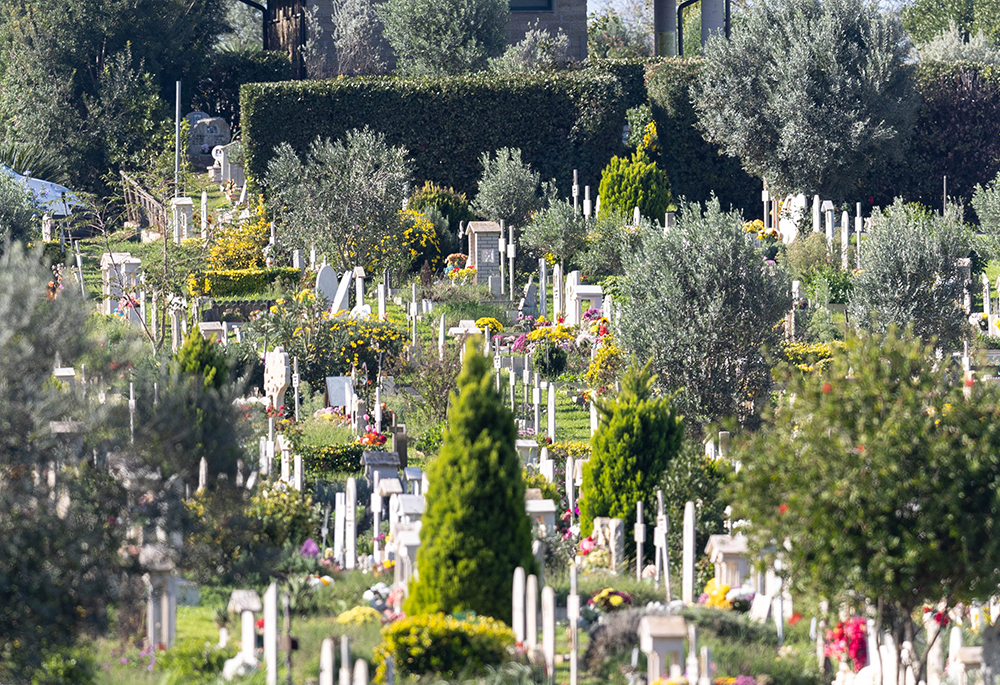
A view of Laurentino cemetery in Rome adorned with flowers and greenery on the feast of All Souls, Nov. 2, 2024. (CNS/Lola Gomez)
Today is the third day of a popular triduum. Beginning with Halloween (actually, the vigil of the feast of All Saints), we celebrate those who have been formally canonized by the church and today we remember "the faithful departed," all who have gone before us.
For Catholics in many parts of the world, this feast outshines the other two. Today, people remember their ancestors and others who left this world before them. Many attend the Eucharist and visit family graves, others celebrate with special meals at home or at the cemetery. In the Peruvian mountains, people gather at loved ones' graves, sharing the deceased's favorite foods and drinks while inviting others to visit and pray with them. However we celebrate, this triduum recognizes our living connections with people longer present in this world.
Today we think about the hereafter. "Here" plus "after," isn't that a funny combination? Obviously it refers to the time beyond death, but it connects our moment to what's to come. It links the now and the future, just as the feast links us across the ages.
Our reading from the Book of Wisdom, popular for funerals, reassures us that God's love will be our primary experience after bodily death. This counteracts grim visions of purgatory as something like a painful jail term designed to purify one from sin (and for which others can pay the bail). While the reading addresses the perennial question of reward and punishment, it emphasizes a glorious future for everyone.
In his book The Great Divorce, C.S. Lewis created a dream vision of the processes of the afterlife. Lewis describes all kinds of people who resist God's invitation to enter the realm of love by clinging to something that doesn't belong there. The book can be embarrassing to read because we too easily recognize ourselves among those who refuse to let go of whatever prevents them from accepting the vulnerability of being loved without limit and without merit. There seems to be something in us, perhaps especially in our competitive culture, that thinks we can and should earn God's love. Doesn't that come from misguided pride and wild egocentrism, even if we try to disguise it as humble striving to be good?
Today's liturgy offers us two options for a second reading, both from Paul's Letter to the Romans. The first (Romans 5:5-11) proclaims, "Hope does not disappoint." Paul invites us to recall and revivify our experience of God's love poured into (and out of) our hearts. He reminds us that Christ took on the mission of embodying divine love for us, whether or not we accept or even want it. Paul teaches that God's love always remains available because Christ continues reconciling.
(Note: careful reading of the Gospels demonstrates that Christ's reconciliation is not a process of getting God to accept us but rather of urging us to know and rejoice in God's limitless love for each and everyone.)
In our second option (Romans 6:3-9), Paul exhorts us to open our hearts and souls to the mystical experience of union with Christ. He reminds us that from the moment of baptism into communion in the body of Christ, we are and will remain one in Christ.
Advertisement
In John's Gospel, Jesus restates this idea saying that he will never reject anyone who comes to him because the Father desires that all should be one in Christ. This union describes eternal life: all of creation sharing divine life in the new fullness of Christ's resurrection.
Each of our readings invites us into ordinary mystical experiences. They tell us we are capable of realizing how deeply united we are as God's creatures. We are created to live in full union with God and one another: here and hereafter, altogether, all at once.
This may not sound much like a traditional approach to All Souls' Day. Some spend this day praying on behalf of those suffering the punishment involved in post-death purification. Think about it. Doesn't that approach overshadow the image of the loving God Jesus described as a Prodigal Father, replacing it with an image of God as a bookkeeper who calculates how much each must pay to gain admittance to heaven? Isn't that a variation of the idea that we can and need to earn the free gift of salvation?
How might we celebrate this day or triduum? Begin by rejoicing in the promises of our baptism: God's unmerited love binds us together across the ages as the body of Christ in union with the Father. Let us take as the theme of this day, "Hope does not disappoint."
Then, together with all the faithful departed, let us sing, "O death, where is your sting?"
